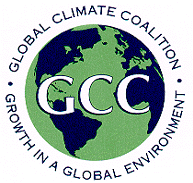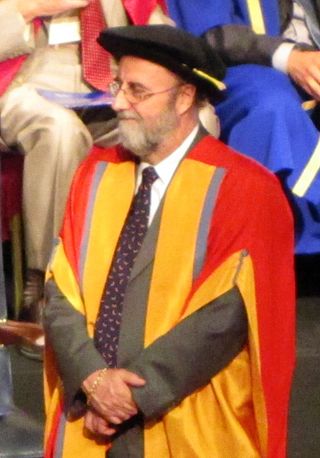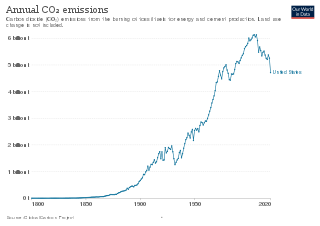Related Research Articles

The Global Climate Coalition (GCC) (1989–2001) was an international lobbyist group of businesses that opposed action to reduce greenhouse gas emissions and engaged in climate change denial, publicly challenging the science behind global warming. The GCC was the largest industry group active in climate policy and the most prominent industry advocate in international climate negotiations. The GCC was involved in opposition to the Kyoto Protocol, and played a role in blocking ratification by the United States. The coalition knew it could not deny the scientific consensus, but sought to sow doubt over the scientific consensus on climate change and create manufactured controversy.

Sir Robert Tony Watson CMG FRS is a British chemist who has worked on atmospheric science issues including ozone depletion, global warming and paleoclimatology since the 1980s. Most recently, he is lead author of the February 2021 U.N. report Making Peace with Nature.
The politicization of science for political gain occurs when government, business, or advocacy groups use legal or economic pressure to influence the findings of scientific research or the way it is disseminated, reported or interpreted. The politicization of science may also negatively affect academic and scientific freedom, and as a result it is considered taboo to mix politics with science. Historically, groups have conducted various campaigns to promote their interests in defiance of scientific consensus, and in an effort to manipulate public policy.
The National Climate Assessment (NCA) is an initiative within the U.S. federal government focused on climate change science, formed under the auspices of the Global Change Research Act of 1990.
The Clear Skies Act of 2003 was a proposed federal law of the United States. The official title as introduced is "a bill to amend the Clean Air Act to reduce air pollution through expansion of cap-and-trade programs, to provide an alternative regulatory classification for units subject to the cap and trade program, and for other purposes."

The domestic policy of the George W. Bush administration was the domestic policy of the United States from 2001 to 2009 while George W. Bush was president. Bush's main domestic policy advisors include Chairman of the Council of Economic Affairs Edward Lazear, Rob Portman, director of the Office of Management and Budget; U.S. Secretary of Labor Elaine Chao, Vice President Dick Cheney; U.S. Secretary of the Treasury Henry Paulson; U.S. Secretary of Commerce Carlos Gutierrez; U.S. Secretary of Health and Human Services Michael O. Leavitt and Allan Hubbard, director of the National Economic Council.
The National Nanotechnology Initiative (NNI) is a research and development initiative which provides a framework to coordinate nanoscale research and resources among United States federal government agencies and departments.
The Research and Innovative Technology Administration (RITA) is a unit of the United States Department of Transportation (USDOT). It was created in 2005 to advance transportation science, technology, and analysis, as well as improve the coordination of transportation research within the department and throughout the transportation community.

The Global Change Research Act 1990 is a United States law requiring research into global warming and related issues. It requires a report to Congress every four years on the environmental, economic, health and safety consequences of climate change.
The Climate Change Science Program (CCSP) was the program responsible for coordinating and integrating research on global warming by U.S. government agencies from February 2002 to June 2009. Toward the end of that period, CCSP issued 21 separate climate assessment reports that addressed climate observations, changes in the atmosphere, expected climate change, impacts and adaptation, and risk management issues. Shortly after President Obama took office, the program's name was changed to U.S. Global Change Research Program (USGCRP) which was also the program's name before 2002. Nevertheless, the Obama Administration generally embraced the CCSP products as sound science providing a basis for climate policy. Because those reports were mostly issued after the Fourth Assessment Report of the Intergovernmental Panel on Climate Change (IPCC), and in some cases focused specifically on the United States, they were generally viewed within the United States as having an importance and scientific credibility comparable to the IPCC assessments for the first few years of the Obama Administration.

Jane Lubchenco is an American environmental scientist and marine ecologist who teaches and conducts research at Oregon State University. Her research interests include interactions between the environment and human well-being, biodiversity, climate change, and sustainable use of oceans and the planet. From 2009 to 2013, she served as Administrator of NOAA and Under Secretary of Commerce for Oceans and Atmosphere. In February 2021, she was appointed by President Joe Biden to serve as Deputy Director for Climate and Environment in the White House Office of Science and Technology Policy.

The High Performance Computing Act of 1991 (HPCA) is an Act of Congress promulgated in the 102nd United States Congress as (Pub.L. 102–194) on December 9, 1991. Often referred to as the Gore Bill, it was created and introduced by then Senator Al Gore, and led to the development of the National Information Infrastructure and the funding of the National Research and Education Network (NREN).
The Carnegie Institution for Science, also known as Carnegie Science and the Carnegie Institution of Washington, is an organization in the United States established to fund and perform scientific research. The institution is headquartered in Washington, D.C. As of June 30, 2020, the Institution's endowment was valued at $926.9 million. In 2018 the expenses for scientific programs and administration were $96.6 million. Eric Isaacs is president of the institution.
The Joint Ocean Commission Initiative is a bipartisan, collaborative group in the United States that aims to "accelerate the pace of change that results in meaningful ocean policy reform." The Joint Initiative was established by the members of two major U.S.-based oceans commissions: the Pew Oceans Commission and the United States Commission on Ocean Policy. It was originally co-chaired by former White House Chief of Staff Leon Panetta and former Chief of Naval Operations Admiral James D. Watkins, chairs of the Pew and U.S. Ocean Commissions, respectively. Currently, the Joint Initiative is led by a Leadership Council, which is co-chaired by Christine Todd Whitman, former EPA Administrator under President George W. Bush and former governor of New Jersey, and Norman Y. Mineta, Secretary of Commerce under President Bill Clinton and Secretary of Transportation under President George W. Bush.

The environmental policy of the United States is a federal governmental action to regulate activities that have an environmental impact in the United States. The goal of environmental policy is to protect the environment for future generations while interfering as little as possible with the efficiency of commerce or the liberty of the people and to limit inequity in who is burdened with environmental costs. As his first official act bringing in the 1970s, President Richard Nixon signed the U.S. National Environmental Policy Act (NEPA) into law on New Years Day, 1970. Also in the same year, America began celebrating Earth Day, which has been called "the big bang of U.S. environmental politics, launching the country on a sweeping social learning curve about ecological management never before experienced or attempted in any other nation." NEPA established a comprehensive US national environmental policy and created the requirement to prepare an environmental impact statement for "major federal actions significantly affecting the quality of the environment." Author and consultant Charles H. Eccleston has called NEPA the world's "environmental Magna Carta".
George W. Bush's political positions have been expressed in public statements, and through his actions in the executive roles of governor of Texas and president of the United States.
The United States Global Change Research Program (USGCRP) coordinates and integrates federal research on changes in the global environment and their implications for society. The program began as a presidential initiative in 1989 and was codified by Congress through the Global Change Research Act of 1990, which called for "a comprehensive and integrated United States research program which will assist the Nation and the world to understand, assess, predict, and respond to human-induced and natural processes of global change."
The climate change policy of the United States has major impacts on global climate change and global climate change mitigation. This is because the United States is the second largest emitter of greenhouse gasses in the world after China, and is among the countries with the highest greenhouse gas emissions per person in the world. Cumulatively, the United States has emitted over a trillion metric tons of greenhouse gases, more than any country in the world.

Warren Morton Washington is an American atmospheric scientist, a former chair of the National Science Board, and currently a Distinguished Scholar at the National Center for Atmospheric Research (NCAR) in Boulder, Colorado.

Robert K. Dixon is an energy, environment, and economic expert at the Office of International Affairs, US Department of Energy headquarters in Washington, DC, USA.
References
- ↑ "Fact Sheet: President Bush Announces Clear Skies & Global Climate Change Initiative". Executive Office of the President of the United States. February 2002. Retrieved 20 November 2008.

